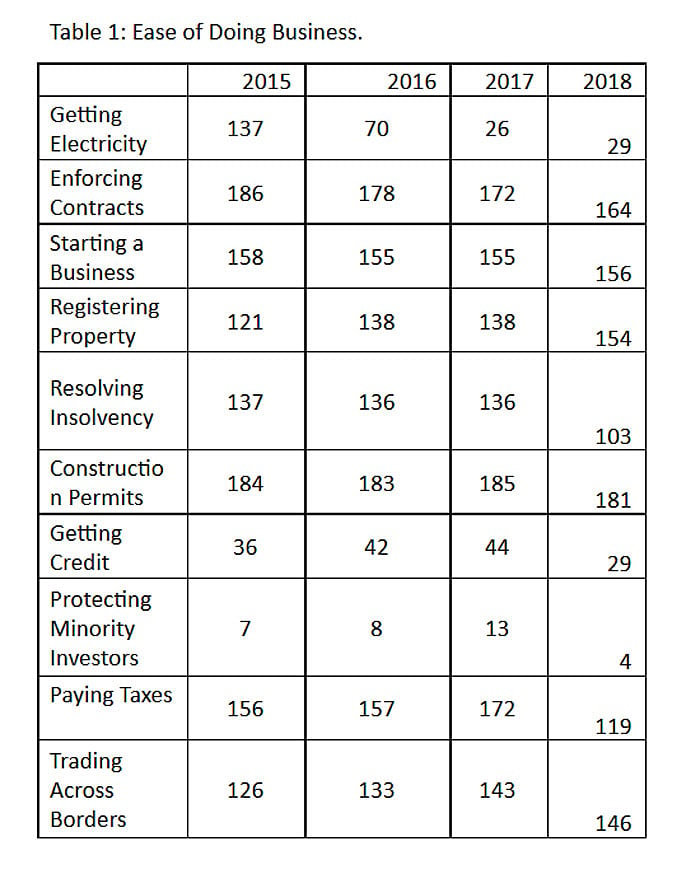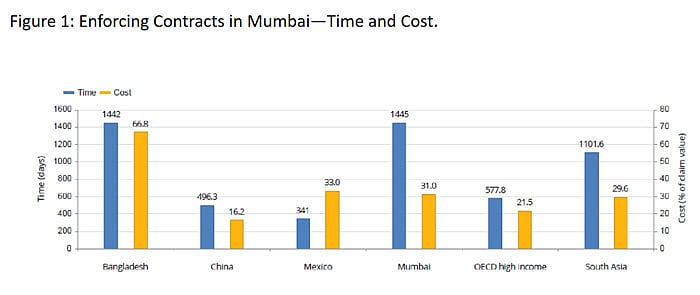The Curious Case of #EaseofDoingBusiness!
The rankings are for Delhi and Mumbai only, nor does the ranking take into account the introduction of GST or demonetisation.
The World Bank’s Ease of Doing Business Rankings are out. India has jumped 30 positions and has been ranked 100th out of 190 countries in the latest rankings. Not surprisingly, the Narendra Modi government has gone on an overdrive to market this huge jump. The mainstream media has chipped in as well.

Support Independent Media
The media must be free and fair, uninfluenced by corporate or state interests. That's why you, the public, need to pay to keep news free.
ContributeBut one important point that no one seems to be making is that the rankings are “largely” limited for the cities of Mumbai and Delhi. As the World Bank points out: “This year’s report covers 11 indicator sets and 190 economies. Most indicator sets refer to a case scenario in the largest business city of each economy, except for 11 economies that have a population of more than 100 million as of 2013 (Bangladesh, Brazil, China, India, Indonesia, Japan, Mexico, Nigeria, Pakistan, the Russian Federation and the United States) where Doing Business, also collected data for the second largest business city.”
So, basically, all the Ease of Doing Business Rankings tells us is that it has become easier to run a business in Mumbai and Delhi. The same cannot be said about the country as a whole. At least, not from these rankings. Hence, there is a reason to celebrate but not as much as the government and the media are.
Take a look at Table 1. It lists the rankings of the 11 indicators that make for the ranking, over the last few years.

Source: PIB and World Bank
What does Table 1 tell us? One of the biggest jumps has been on the paying taxes front, where the ranking has improved to 119 from 172 earlier. As the report with the rankings points out: “This topic records the taxes and mandatory contributions that a medium-size company must pay or withhold in a given year, as well as measures the administrative burden in paying taxes and contributions.”
So, what were the reasons behind this jump? As the World Bank points out: “paying taxes [were made] easier by making payment of EPF mandatory electronically and introducing a set of administrative measures easing compliance with corporate income tax.”
Also, “the most recent round of data collection for the project was completed on June 30, 2017”. This means that the introduction of Goods and Services Tax and the chaos that it has created hasn’t been captured by these rankings.
Another indicator on which rankings have dramatically improved are on the “getting electricity” front, from 137 in 2015 to 29, currently. This has happened on the back of the fact that getting electricity became “faster and cheaper by streamlining the process of getting a new commercial electricity connection,” in earlier years. This might be true for Delhi and Mumbai, but it is not necessarily true for the country as a whole.
Things have improved on the resolving insolvency front with the adoption of “a new insolvency and bankruptcy code that introduced a reorganization procedure for corporate debtors and facilitated continuation of the debtor’s business during insolvency proceedings”. The insolvency and bankruptcy code has also helped improve the ranking of the “getting credit” indicator.
While the insolvency and bankruptcy code has been introduced, whether it is able to solve the huge bad loans problem of banks in general and public sector banks in particular, remains to be seen.
The enforcing contracts indicator also jumped in rankings because enforcing contracts were made easier “by introducing the National Judicial Data Grid, which makes it possible to generate case measurement reports on local courts.”
So, yes, things have improved on multiple fronts. Nevertheless, one point that everybody seems to have missed out on is that how badly the indicators which are needed to create jobs, are ranked.
Let’s list out these parameters one by one:
- Starting a business: 156. If it is so tough for individuals to start a new business, how are jobs ever going to be created? One million Indians are entering the workforce every month. As the World Bank points out: “India made starting a business faster by merging the applications for the Permanent Account Number (PAN) and the Tax Account Number (TAN), and by improving the online application system. This reform applies to both Delhi and Mumbai. Mumbai also made starting a business faster by merging the applications for the value-added tax and the profession tax.” Despite this, India’s ranking on the starting a business indicator fell. What does this tell us? It tells us that other countries are doing much more to make it even easier for people to start a new business.
- Registering property: 154. This is something that every new businessman wanting to establish a factory needs to deal with. The ranking has slipped miserably on this indicator.
- Construction permits: 181. The ranking has improved marginally on this front, but we still are almost at the bottom of 190 countries which are a part of this ranking. The construction sector is a very important sector if jobs are to be created for the low-skilled labour that is entering India’s workforce.
- Enforcing contracts: 164. The ranking, in this case, has improved a little, nevertheless, it’s still too low. Take a look at Figure 1. If businesses are to thrive, the time and money taken to enforce contracts judicially has to come down dramatically.

- Source: World Bank
- Trading across borders: 146. The World Bank points out that the import border compliance time was reduced in Mumbai by improving infrastructure at the Nhava Sheva Port. Despite this, the overall ranking of this indicator fell. Take a look at Table 2. The table clearly shows us how much we still need to catch up on this front.

- Source: World Bank
To conclude, yes, things have improved, but it is worth keeping in mind that these improvements are largely limited to two cities. Further, the benefits of some measures like the new insolvency and bankruptcy code are yet to be seen.
And, in the end, the Ease of Doing Business rankings, does not take into account the negative impact that demonetisation had on the economy. It ended up destroying a significant section of the informal economy.
(Vivek Kaul is the author of India’s Big Government—The Intrusive State and How It is Hurting Us).

Power NL-TNM Election Fund
General elections are around the corner, and Newslaundry and The News Minute have ambitious plans together to focus on the issues that really matter to the voter. From political funding to battleground states, media coverage to 10 years of Modi, choose a project you would like to support and power our journalism.
Ground reportage is central to public interest journalism. Only readers like you can make it possible. Will you?
